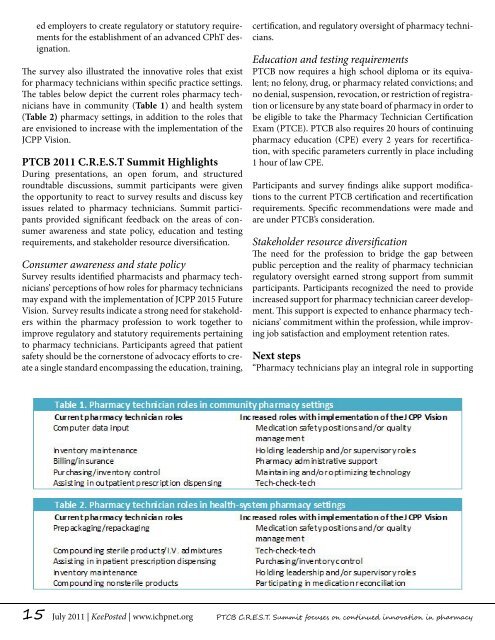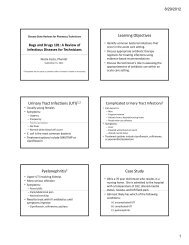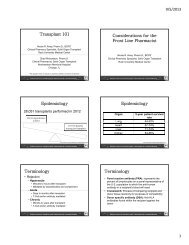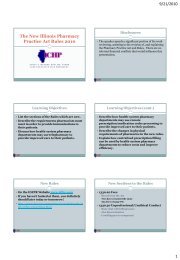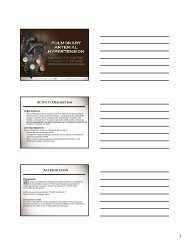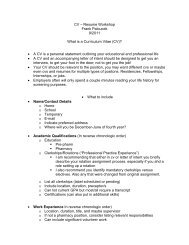KeePosted - ICHP
KeePosted - ICHP
KeePosted - ICHP
You also want an ePaper? Increase the reach of your titles
YUMPU automatically turns print PDFs into web optimized ePapers that Google loves.
ed employers to create regulatory or statutory requirements<br />
for the establishment of an advanced CPhT designation.<br />
The survey also illustrated the innovative roles that exist<br />
for pharmacy technicians within specific practice settings.<br />
The tables below depict the current roles pharmacy technicians<br />
have in community (Table 1) and health system<br />
(Table 2) pharmacy settings, in addition to the roles that<br />
are envisioned to increase with the implementation of the<br />
JCPP Vision.<br />
PTCB 2011 C.R.E.S.T Summit Highlights<br />
During presentations, an open forum, and structured<br />
roundtable discussions, summit participants were given<br />
the opportunity to react to survey results and discuss key<br />
issues related to pharmacy technicians. Summit participants<br />
provided significant feedback on the areas of consumer<br />
awareness and state policy, education and testing<br />
requirements, and stakeholder resource diversification.<br />
Consumer awareness and state policy<br />
Survey results identified pharmacists and pharmacy technicians’<br />
perceptions of how roles for pharmacy technicians<br />
may expand with the implementation of JCPP 2015 Future<br />
Vision. Survey results indicate a strong need for stakeholders<br />
within the pharmacy profession to work together to<br />
improve regulatory and statutory requirements pertaining<br />
to pharmacy technicians. Participants agreed that patient<br />
safety should be the cornerstone of advocacy efforts to create<br />
a single standard encompassing the education, training,<br />
certification, and regulatory oversight of pharmacy technicians.<br />
Education and testing requirements<br />
PTCB now requires a high school diploma or its equivalent;<br />
no felony, drug, or pharmacy related convictions; and<br />
no denial, suspension, revocation, or restriction of registration<br />
or licensure by any state board of pharmacy in order to<br />
be eligible to take the Pharmacy Technician Certification<br />
Exam (PTCE). PTCB also requires 20 hours of continuing<br />
pharmacy education (CPE) every 2 years for recertification,<br />
with specific parameters currently in place including<br />
1 hour of law CPE.<br />
Participants and survey findings alike support modifications<br />
to the current PTCB certification and recertification<br />
requirements. Specific recommendations were made and<br />
are under PTCB’s consideration.<br />
Stakeholder resource diversification<br />
The need for the profession to bridge the gap between<br />
public perception and the reality of pharmacy technician<br />
regulatory oversight earned strong support from summit<br />
participants. Participants recognized the need to provide<br />
increased support for pharmacy technician career development.<br />
This support is expected to enhance pharmacy technicians’<br />
commitment within the profession, while improving<br />
job satisfaction and employment retention rates.<br />
Next steps<br />
“Pharmacy technicians play an integral role in supporting<br />
15 July 2011 | <strong>KeePosted</strong> | www.ichpnet.org<br />
PTCB C.R.E.S.T. Summit focuses on continued innovation in pharmacy


